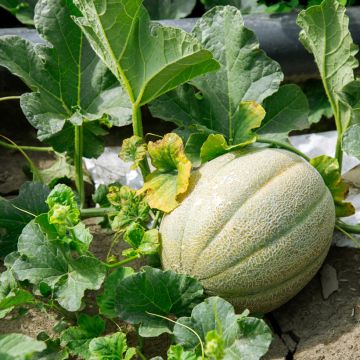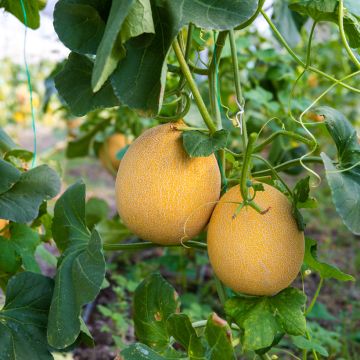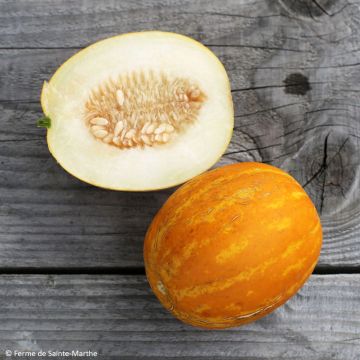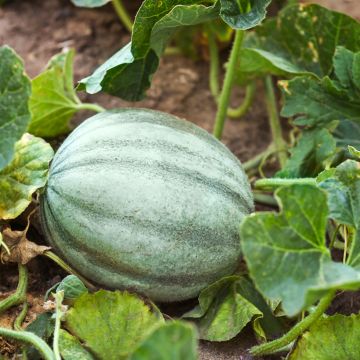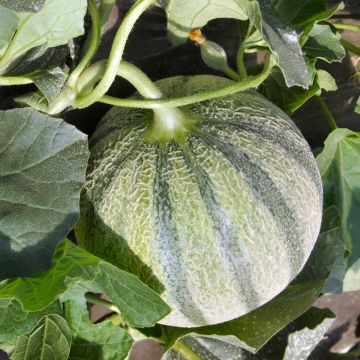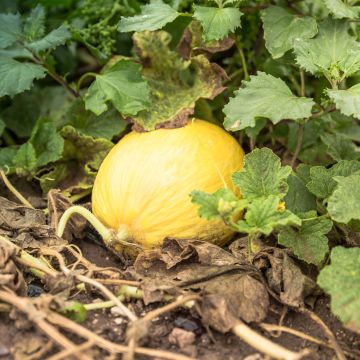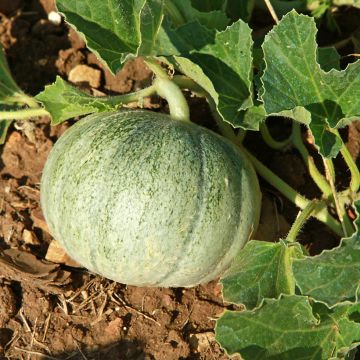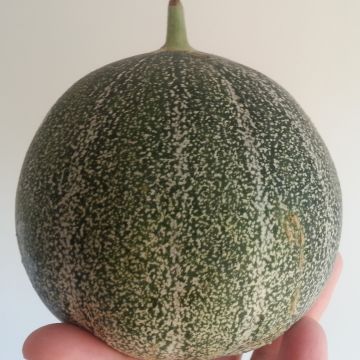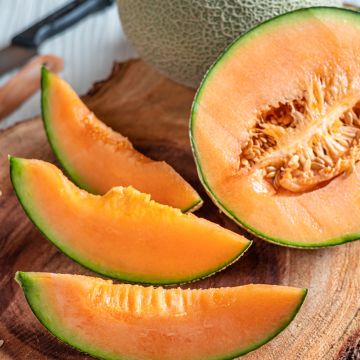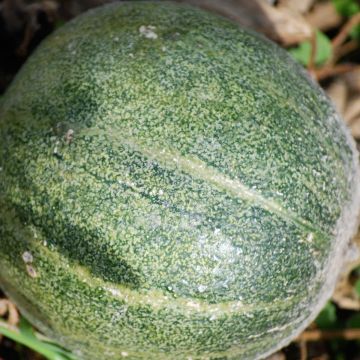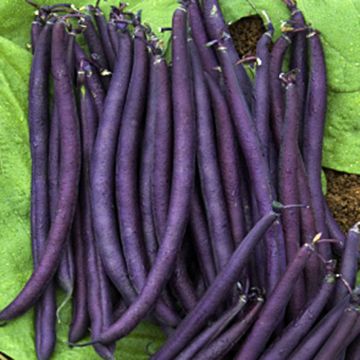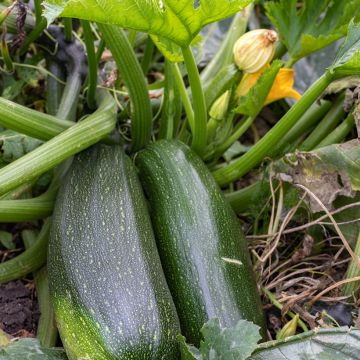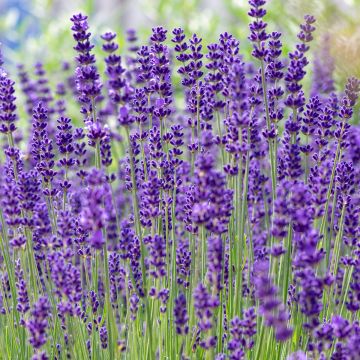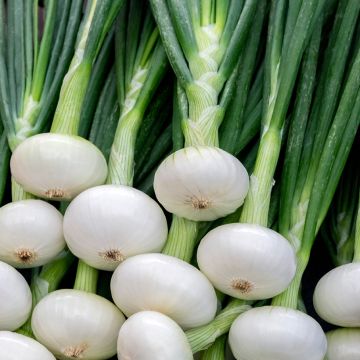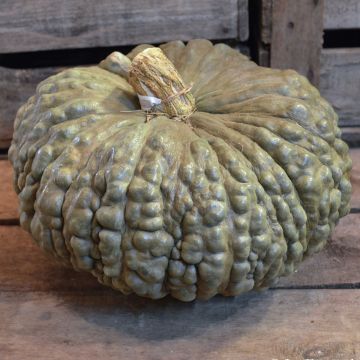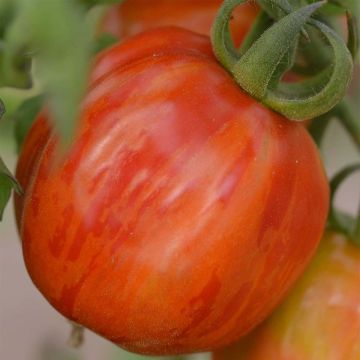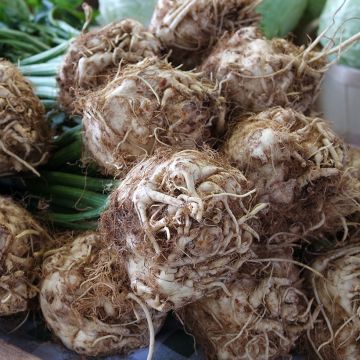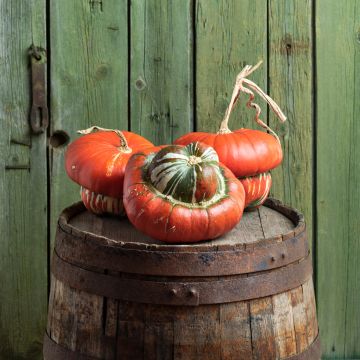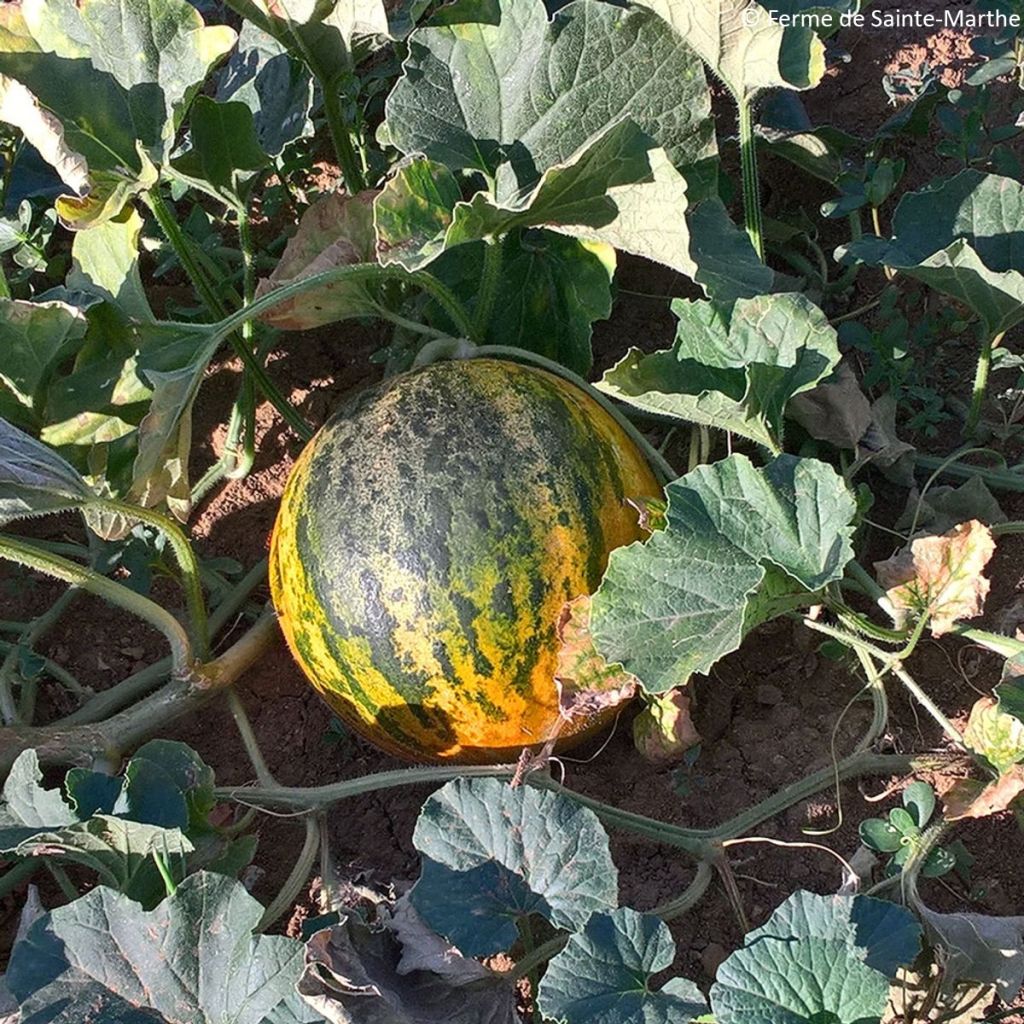

Melon Banana di Lentigione Bio - Ferme de Sainte Marthe
Cucumis melo Banana di Lentigione
Cucumis melo Banana di Lentigione
Melon
Special offer!
Receive a €20 voucher for any order over €90 (excluding delivery costs, credit notes, and plastic-free options)!
1- Add your favorite plants to your cart.
2- Once you have reached €90, confirm your order (you can even choose the delivery date!).
3- As soon as your order is shipped, you will receive an email containing your voucher code, valid for 3 months (90 days).
Your voucher is unique and can only be used once, for any order with a minimum value of €20, excluding delivery costs.
Can be combined with other current offers, non-divisible and non-refundable.
Home or relay delivery (depending on size and destination)
Schedule delivery date,
and select date in basket
This plant carries a 6 months recovery warranty
More information
We guarantee the quality of our plants for a full growing cycle, and will replace at our expense any plant that fails to recover under normal climatic and planting conditions.
Description
Cucumis melo 'Banana di Lentigione' is an ancestral Italian variety that has been somewhat lost to history. It is still cultivated by a few families in a small region along the border between the provinces of Reggio Emilia and Parma. This melon doesn't resemble any known ancient variety. It is classified as a 'banana' melon, not because of the shape of its fruits but because its flesh has a vague banana flavour. To be fully appreciated, the fruit must be harvested at perfect ripeness, when the stem begins to detach. It should also be consumed quickly. Sow in a warm location from March to May for a harvest 80 days later.
The 'Banana di Lentigione' melon is a hardy and vigorous variety that can tolerate clayey soils. It has a creeping habit. Each plant produces 3 or 4 round melons with thin and smooth green skin with dark and irregular stripes. At maturity, the skin turns yellow-orange, while still retaining the green stripes. The whitish flesh is 3 to 4cm (1 to 2in) thick, and tender and juicy. Harvested at perfect ripeness, this melon boasts meltingly sweet flesh with intense aromas of banana with a touch of pear. The fruits weigh between 1 and 2 kg.
The melon is a compact fruit that is round or oblong with a smooth, ribbed or reticulated skin. The juicy flesh can be green, white, yellow, or orange, and surrounds a central cavity filled with seeds. It is commonly consumed raw as an appetiser or sweet dessert, as well as in sorbets, jams, compotes, or syrup. The small melons removed during thinning and pruning can be pickled in vinegar with herbs. Melons are hydrating, refreshing, and diuretic. They are reputed to be rich in trace elements and vitamins B and C in particular. Orange-fleshed varieties also contain vitamin A (the famous carotene).
They are annual creeping herbaceous plants, with female flowers distinguished from male flowers by their inferior ovary (under the flower), resembling an embryo of a fruit. They are located on the secondary or tertiary branches of each plant and will develop into the fruit. As for the male flowers, they always appear in the axils of the leaves on the main stem.
Harvesting: wait four weeks between fruit formation and picking. The fruit will emit a sweet smell and the stalk will start to detach, indicating that the melon is ready to be harvested.
Storage: an unopened Banana di Lentigione melon can be stored for a maximum of 2-3 days in a dry and ventilated place. Rest it on racks, for example. If it has been cut open or is damaged, you can freeze it (cut the flesh into pieces and moisten it with lemon juice).
The gardener's tip: place a slate tile under the fruit to block direct contact with the ground. This avoids rotting from excess moisture. Mulch around the plants, especially during the height of summer, as melon plants like moist soil.
Melons are highly susceptible to powdery mildew (a fungal disease that leaves a white powdery coating on the surface of the leaves). Be careful not to water the leaves or flowers.
Melons are nutrient-demanding fruits. They belong to the Cucurbitaceae family, like cucumbers, watermelons, and squash, etc. This family are notorious for depleting the nutrients in the soil. Therefore, it is advisable not to grow this type of fruit in the same location, or consecutively, in order to avoid excessively depleting the soil.
Organic or "AB" seeds come from plants grown in organic farming (without the use of phytosanitary products). They undergo no treatment after harvest. These seeds are suitable for organic market gardening.
Report an error about the product description
Harvest
Plant habit
Foliage
Botanical data
Cucumis
melo
Banana di Lentigione
Cucurbitaceae
Melon
Mediterranean
Annual
Other Melon
View all →Planting and care
Soil preparation
Melons need nutrient-rich soil and plenty of warmth for successful fruiting. They prefer a sunny location. They appreciate moist but well-drained soils. Ideally, the soil should be sandy, well-drained, and slightly acidic in pH. Take care to prepare the soil by aerating it to a depth of about 10cm (4in), without turning it over. Dig a hole to accommodate the plant and fill it with well-decomposed manure or compost, which should be mixed with the soil to avoid burning the roots. If the soil is not well-drained, it is possible to create a small mound for each plant.
Sowing under glass
Melons can be grown in vegetable gardens. However, it is usually preferable to sow them on a warm bed in a greenhouse before transplanting them into open ground. From the end of March, fill your pots or trays with special seed compost and plant the melon seeds, with the pointed end downwards, to facilitate root development. Moisten the soil, which should remain moderately damp. The seeds usually germinate in 14 days. As soon as the plants have three true leaves, you can transplant them into open ground. Make sure that the soil is warm enough beforehand. The temperature should be between 18 and 26°C (64.4 and 78.8°F) for optimal growth. Take care to space each plant 80cm (32in) apart in all directions.
Sowing in open ground
It is possible to sow melon seeds directly into open ground in warm regions or on the Atlantic coast. Make sure that the soil is sufficiently warmed up beforehand. Then, sow two to three seeds in individual holes, with the pointed end facing downwards. Repeat the process, spacing them at least 80cm (32in) apart in all directions. Moisten the soil, which should remain moderately damp. When the plants have three true leaves, keep the strongest one.
Seedlings
Care
Intended location
This item has not been reviewed yet - be the first to leave a review about it.
Similar products
Haven't found what you were looking for?
Hardiness is the lowest winter temperature a plant can endure without suffering serious damage or even dying. However, hardiness is affected by location (a sheltered area, such as a patio), protection (winter cover) and soil type (hardiness is improved by well-drained soil).

Photo Sharing Terms & Conditions
In order to encourage gardeners to interact and share their experiences, Promesse de fleurs offers various media enabling content to be uploaded onto its Site - in particular via the ‘Photo sharing’ module.
The User agrees to refrain from:
- Posting any content that is illegal, prejudicial, insulting, racist, inciteful to hatred, revisionist, contrary to public decency, that infringes on privacy or on the privacy rights of third parties, in particular the publicity rights of persons and goods, intellectual property rights, or the right to privacy.
- Submitting content on behalf of a third party;
- Impersonate the identity of a third party and/or publish any personal information about a third party;
In general, the User undertakes to refrain from any unethical behaviour.
All Content (in particular text, comments, files, images, photos, videos, creative works, etc.), which may be subject to property or intellectual property rights, image or other private rights, shall remain the property of the User, subject to the limited rights granted by the terms of the licence granted by Promesse de fleurs as stated below. Users are at liberty to publish or not to publish such Content on the Site, notably via the ‘Photo Sharing’ facility, and accept that this Content shall be made public and freely accessible, notably on the Internet.
Users further acknowledge, undertake to have ,and guarantee that they hold all necessary rights and permissions to publish such material on the Site, in particular with regard to the legislation in force pertaining to any privacy, property, intellectual property, image, or contractual rights, or rights of any other nature. By publishing such Content on the Site, Users acknowledge accepting full liability as publishers of the Content within the meaning of the law, and grant Promesse de fleurs, free of charge, an inclusive, worldwide licence for the said Content for the entire duration of its publication, including all reproduction, representation, up/downloading, displaying, performing, transmission, and storage rights.
Users also grant permission for their name to be linked to the Content and accept that this link may not always be made available.
By engaging in posting material, Users consent to their Content becoming automatically accessible on the Internet, in particular on other sites and/or blogs and/or web pages of the Promesse de fleurs site, including in particular social pages and the Promesse de fleurs catalogue.
Users may secure the removal of entrusted content free of charge by issuing a simple request via our contact form.
The flowering period indicated on our website applies to countries and regions located in USDA zone 8 (France, the United Kingdom, Ireland, the Netherlands, etc.)
It will vary according to where you live:
- In zones 9 to 10 (Italy, Spain, Greece, etc.), flowering will occur about 2 to 4 weeks earlier.
- In zones 6 to 7 (Germany, Poland, Slovenia, and lower mountainous regions), flowering will be delayed by 2 to 3 weeks.
- In zone 5 (Central Europe, Scandinavia), blooming will be delayed by 3 to 5 weeks.
In temperate climates, pruning of spring-flowering shrubs (forsythia, spireas, etc.) should be done just after flowering.
Pruning of summer-flowering shrubs (Indian Lilac, Perovskia, etc.) can be done in winter or spring.
In cold regions as well as with frost-sensitive plants, avoid pruning too early when severe frosts may still occur.
The planting period indicated on our website applies to countries and regions located in USDA zone 8 (France, United Kingdom, Ireland, Netherlands).
It will vary according to where you live:
- In Mediterranean zones (Marseille, Madrid, Milan, etc.), autumn and winter are the best planting periods.
- In continental zones (Strasbourg, Munich, Vienna, etc.), delay planting by 2 to 3 weeks in spring and bring it forward by 2 to 4 weeks in autumn.
- In mountainous regions (the Alps, Pyrenees, Carpathians, etc.), it is best to plant in late spring (May-June) or late summer (August-September).
The harvesting period indicated on our website applies to countries and regions in USDA zone 8 (France, England, Ireland, the Netherlands).
In colder areas (Scandinavia, Poland, Austria...) fruit and vegetable harvests are likely to be delayed by 3-4 weeks.
In warmer areas (Italy, Spain, Greece, etc.), harvesting will probably take place earlier, depending on weather conditions.
The sowing periods indicated on our website apply to countries and regions within USDA Zone 8 (France, UK, Ireland, Netherlands).
In colder areas (Scandinavia, Poland, Austria...), delay any outdoor sowing by 3-4 weeks, or sow under glass.
In warmer climes (Italy, Spain, Greece, etc.), bring outdoor sowing forward by a few weeks.






























